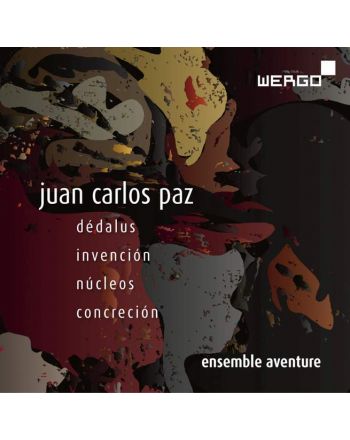Juan Carlos Paz
Country of origin:
Argentina
Birthday:
August 5, 1901
Date of death:
August 25, 1972
About Juan Carlos Paz
For half a century Juan Carlos Paz, as a composer and concert organizer, musicolo- gist and educator, author and actor has had such an aesthetical impact on the Avantgarde in Argentina and Latin America that there is hardly a present-day composer in Latin America who has not been affected by his influence.This immense significance (strangely contradictory to his lonely life and today’s lack of public awareness) owes not only to Paz’s versatility, extending from twelve-tone technique, metrical experiments, and jazz influences to physical compositions and free concepts, but also to the extensive contacts between the highly cultivated composer and the artists, painters and writers of his day.
Juan Carlos Paz epitomizes a lifelong questioning spirit, propagating and promoting the artistic Avantgarde as opposed to the so-called musical nationalists like Alberto Ginastera or Carlos Chávez. Paz’s early compositions were clearly influenced by Richard Wagner, César Franck and Claude Debussy. Subsequently he experimented with polytonality, as in Tema con transformaciones (1928, origi- nally titled Variaciones politonales) using various clefs simultaneously. In his Primera composición dodecafónica, op. 26, for flute, cor anglais and violoncello (1934) Paz was the first Latin American composer to implement and propagate Schoenberg’s method of “composing with twelve tones”. In the 1940s he pro- gressively abandoned rigid serial techniques, adopting additive and irregular met- rics, new instrumentations and free structures, inspired, among others, by the music of his friend and correspondent Edgard Varèse. Towards the end of his life Paz experimented with aleatorics and graphic notation, as in his freely instrumen- tated Seis eventos from 1972, staying true to his lifelong spirit of curiosity and adventure.
Paz was a highly respected teacher and standard reference figure for many notable composers, such as Mauricio Kagel, Mariano Etkin and others. He orga- nized concert series with new music where the most important works by Arnold Schoenberg, Anton Webern, Charles Ives, Edgard Varèse, Karlheinz Stockhausen, Luigi Nono, Bruno Maderna, Luciano Berio etc. were performed alongside compo- sitions (and premieres) by young Argentinean composers. His continuous activi- ties as a composer, teacher, concert promoter and musicologist played a crucial role in opening the Argentinean music and art scene, which at the time was academic and constricted. It was like a breath of fresh air assisting aspiring generations of com- posers in their search for new aesthetical possibilities and a personal musical language.
Juan Carlos Paz initially studied piano, organ and music theory in Buenos Aires. After autodidactic studies of classical scores and of Vincent D’Indy’s Cours de Composition Musicale (1903 and 1909), he decided to attend D’Indy’s course at the Schola Cantorum in Paris in 1924. In Buenos Aires in 1929, along with other Argentinean composers, he founded the “Grupo Renovación”, playing an active role as a composer and pianist in their concerts. In 1937, he left the ensemble and founded the “Conciertos de la Nueva Música” later known as the “Agrupación Nueva Música” with the purpose of furthering the newest musical trends. He was constantly in contact with eminent artists of the time and was himself an active writer. His articles were published in art magazines such as the Anales de Buenos Aires (in which articles by Julio Cortázar also appeared), and the Papeles de Buenos Aires edited by Macedonio Fernández. In addition, he had contacts to the painter and surrealist, Xul Solar, the Madí group and other artists. Furthermore, he worked closely with the film director Leopoldo Torre Nilsson (Paz composed the music for six of his most famous films) and acted a major role in the cult-film Invasión by Hugo Santiago (1969).
Wolfgang Rüdiger
Products
-
Composer: Juan Carlos PazInterpreter: Akiko OkabeOrchestra/ensemble: Ensemble AventureConductor: Alexander OttMedia Type: CDProduct number: WER 73272CDCDIn stock€18.50Incl. Tax, Excl. Shipping

